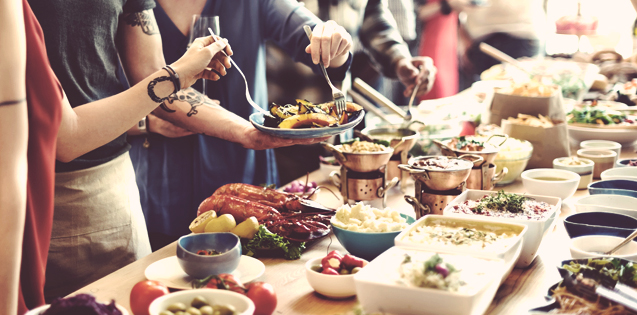A few years ago, Kathy Fletcher and David Simpson discovered a unique way to reach their son’s teenage friends: Invite them over for dinner. In “The Power of a Dinner Table,” David Brooks highlights this couple’s practice and the difference it’s made in the lives of teens.
The kids who show up at Kathy and David’s have endured the ordeals of modern poverty: homelessness, hunger, abuse, sexual assault. Almost all have seen death firsthand — to a sibling, friend or parent.
It’s anomalous for them to have a bed at home. One 21-year-old woman came to dinner last week and said this was the first time she’d been around a family table since she was 11.
And yet by some miracle, hostile soil has produced charismatic flowers. Thursday dinner is the big social occasion of the week. Kids come from around the city. Spicy chicken and black rice are served. Cellphones are banned (“Be in the now,” Kathy says).
These dinner gatherings are a place of healing and hope. Homeless teens have gone to college as a result. More than that, they’ve found a safe place to be themselves, give and receive love, and feel understood and valued by others. David and Kathy’s table is literally changing lives.
Missing Family Dinner
When I moved out on my own at 22, I more or less gave up family dinner, something I’d experienced for most of my life. I didn’t really notice the change at first. After all, it was kind of cool to make my own decisions each mealtime, which often included eating leftovers or cereal for dinner. But in the two years I lived on my own, I felt the emotional and social toll of losing those shared mealtimes.
When I moved into a house with three other young women, we made an effort to share several meals a week together. One friend loved trying out new soups. (Oh, how she loved soup!) And another housemate had a flair for throwing dinner parties.
When Thanksgiving rolled around, each of us tackled a side dish, and we invited over a few friends we knew didn’t have family in town. After we’d eaten our fill, we told stories and played games and filled the house with laughter. Then we donned coats, protection against the Colorado chill, and strung Christmas lights on the tree outside our front door.
The following year, when some friends and I formed an improvisational comedy troupe, we decided to begin each practice with a meal. We took turns hosting and providing the meal for that night. Some nights we had steak, other nights we had grilled cheese sandwiches. It didn’t really matter what we ate; the fellowship and conversation were the main attraction. We often joked that our mealtimes did more to better our performance on stage than our practices did — and it was probably true. The years I was part of that troupe were some of the richest of my young adult years, mostly because of dinner.
The Discipline of Table Fellowship
The table is a powerful place that is mentioned frequently in Scripture. God prepares a table for us in the presence of our enemies (Psalm 23:5). Feasts and banquets are frequently mentioned, including the Marriage Supper of the Lamb when God will establish His forever reign. Jesus spent a lot of time at tables, too: eating with sinners, sharing a Passover meal with his disciples, cooking breakfast for Peter by the Sea of Galilee. In “The Dinner Table as a Place of Connection, Brokenness, and Blessing,” Barry D. Jones writes:
I’m convinced that one of the most important spiritual disciplines for us to recover in the kind of world in which we live is the discipline of table fellowship. In the fast-paced, tech-saturated, attention-deficit-disordered culture in which we find ourselves, Christians need to recover the art of a slow meal around a table with people we care about. “Table fellowship” doesn’t often make the list of the classical spiritual disciplines. But in the midst of a world that increasingly seems to have lost its way with regard to matters of both food and the soul, Christian spirituality has something important to say about the way that sharing tables nourishes us both physically and spiritually. We need a recovery of the spiritual significance of what we eat, where we eat, and with whom we eat.
Tables are places to eat, connect, laugh, cry, pray, and be human. Most of all, tables are a place to belong and feel included. That’s what David and Kathy have discovered. With so much division in this world, tables bring people together. As Thanksgiving approaches, who can you invite to your table? Whose table might you join? And looking ahead to the coming year, how can you incorporate the discipline of table fellowship?
Jones writes, “Perhaps before we invite people to Jesus or invite them to church, we should invite them to dinner.” I’m inclined to agree. For sinners and saints alike have found Jesus there.
Copyright 2016 Suzanne Hadley Gosselin. All rights reserved.












